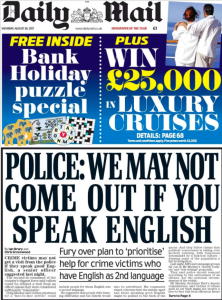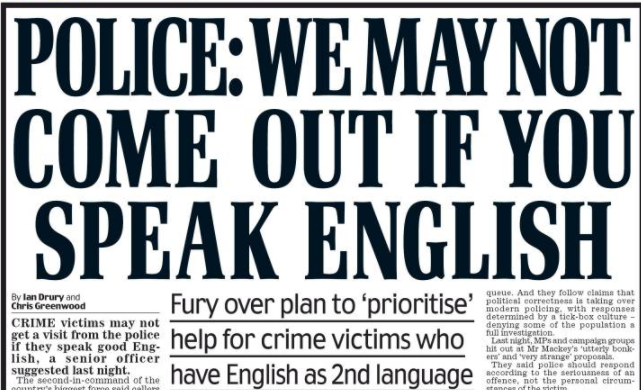
Frank Monaghan writes widely about language and the media. In this post, he discusses the impact of news stories on public attitudes to migrants.
I was hoping to kick off my occasional blog spot about language in the media with a feel-good story about bilingual kids getting brilliant exam results and heading off to the sunset, as I like to think of Oxbridge. But those chaps at the Daily Mail just have to keep ruining my vibe with front pages like this one, which was the first thing I saw on the Saturday of the Notting Hill Carnival, as I popped into the supermarket after a delightful walk on Hampstead Heath and breakfast at Kenwood – yes, I’m that metropolitan elite.

Now you might be forgiven for imagining that the police had perhaps developed some strange new phobia that meant even the merest hint of a fully rounded RP vowel would throw them into anaphylactic shock, or even fear that the recent strides in the police force’s encouragement of LGBTQ officers to emerge from the closet was similarly at risk. But no, this was just the latest in the long line of Daily Mail headlines to exhibit their Cnut-like efforts to deny the fact that we live in a multilingual country. Previous efforts have included loud protestations about ‘the swarm on our streets’, dire warnings about ‘nurses who can’t speak English put patients at risk’, and (one of my personal favourites) this anguished alarm: ‘millions are eating halal food without realising it’ (also without it doing them any harm, it would seem.) It’s gotten so bad now that psychotherapists are routinely advise delusional clients that they are no longer in ‘denial’ but in ‘demail’.
But there are, of course, some serious points to be made about this. The headline is a classic example of how this type of ‘journalism’ seeks to exploit a narrative that the actual facts behind the story it reports do not really support. What this account is based on is a statement by Craig Mackey, the deputy commissioner of the Met, saying that as a result of cuts in police numbers, the Met would have to prioritise face-to- face visits to victims of ‘lesser’ crimes such as vehicle theft based on the vulnerability of the victim. Yes, he did include people who don’t have English as their first language in that grouping, but he also mentioned vulnerable elderly people and those with learning
difficulties. He was quite clear that more serious crimes, such as burglary, would still usually result in a visit. There is no mention of this on the Daily Mail front page (and I’m afraid my devotion to linguistic analysis does not include buying the paper), unlike the Guardian’s account of this (tucked away on page 3).

So, a story that Mackey apparently intended to be about cuts in police numbers and their inevitable consequences is turned into a story suggesting that English-speakers – and you know which English-speakers they have in mind – are being put at the back of the queue while foreigners are prioritised for services. It’s the same story they tell about NHS ‘tourists’ taking up ‘our’ hospital beds, immigrants jumping the queue for social housing, English-speaking children being ignored in ‘our’ classrooms whilst teachers deal with new arrivals.
We can easily laugh off stories like these as self-evident nonsense that falls apart as soon as you look beyond the headline, and doubtless their creators know this, but these distortions are pernicious and must be challenged not because I think even Daily Mail readers will necessarily take this story at face value, but because the piling on of such stories over time creates a discourse that normalises the underlying narrative that ‘we’ are being denied our rightful share by ‘them’. It creates a context (con-text?) in which one group is pitted against another rather than recognising that what is actually required are services for all of us.

The EAL Journal is published termly by NALDIC, the subject association for EAL. Visit www.naldic.org.uk to become a member.


